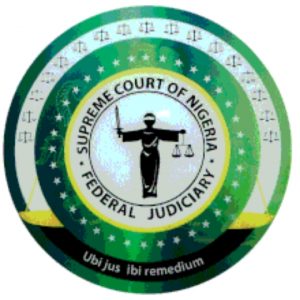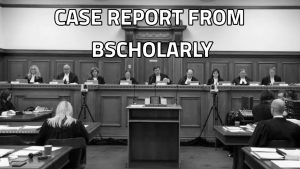AG Federation v AG Abia State: The Constitution confers many powers on the different bodies of the government. The arms of government, the tiers of government and other bodies that were created and established.
It also confers on these various bodies, functions that will be carried out by them.
In the spirit of Federalism, different powers, functions and responsibilities are conferred and imposed, respectively, on the different arms of government. This is to encourage separate governmental administration, promoting independence of the States and still, encouraging unity of the Federation.
In light of the above, a Federation Account is created by the Constitution to fund these separate administrations. This is provided in Section 162(1) of the Constitution.
The Constitution confers on the Supreme Court, original jurisdiction to determine disputes between the Federation and the States and between States. Thus, where there are issues between these two parties, an action is brought in the Supreme Court.
In the case of AG FEDERATION V. AG ABIA STATE, the jurisdiction of the Supreme Court to hear a particular matter between the Federation and the State was determined, among other issues.

Recommended: Facts, Issues and Judgment of Court In Anekwe v Nweke
Fact Summary of AG Federation v AG Abia State
The AG of the Federation sued the government of all the States of the Federation, including the Federal Capital Territory of Nigeria, Abuja. He sued under Section 232 of the Constitution of the Federal Republic of Nigeria, 1999 (as amended), which confers on the Supreme Court, the power to preside over matters between the Federation and the State or between the State and another or other States, in its original jurisdiction.
The Federal Government wanted to know the amount of revenue that would accrue to it from the natural resources of Littoral states in the country and thus, the Supreme Court was to determine the seaward boundary of the States.
Eleven States raised a preliminary objection, challenging the jurisdiction of the Court under Section 232 of the Constitution of the Federal Republic of Nigeria, and contending that the Supreme Court only had original jurisdiction to entertain the matter if there was a dispute between the parties, but that the plaintiff’s statement of claim revealed no dispute or cause of action.
The defendants raised other objections, including the lack of jurisdiction on the part of the Supreme Court to determine State boundaries; the alleged fact of misjoinder of non-littoral States; the irregularity of the procedure of instituting the action; the premature nature of the action; the alleged fact that the plaintiff had no locus standi to bring the action; and that the Supreme Court had no jurisdiction to determine Section 162(2) of the Constitution of the Federal Republic of Nigeria.
Section 162(1) provides that there shall be an account called the ‘Federation Account‘. Subsection 2 provides that the President can bring before the National Assembly, proposals on the allocation of revenue.
The Littoral States of the Federation are the following States: Akwa-Ibom, Bayelsa, Cross River, Delta, Lagos, Ogun, Ondo and Rivers. This is the ground for the plaintiff’s argument that other States were wrongfully joined.
The plaintiff argued that the waters of the States were its low waters within its lands and that the natural resources derived from the territorial waters of the Federation and that of the Federal Capital Territory was the revenue of the Federation and not the State.
The Plaintiff also claimed that the Exclusive Economic Zone and the Continental Shelf of Nigeria were subject to treaties and natural resources derived from these areas were derived from the Federation and not the State.
The Plaintiff, thus, claimed that it is only the Federal Government that has the executive, legislative and judicial rights over these areas designated the territorial waters and the Exclusive Economic Zone and the Continental Shelf of Nigeria.
The Littoral States denied the above averments, claiming that these resources were located within their States.
It was argued by the defendants that the issue of the coastal boundaries of the country was an issue in the law of the sea and thus, was an international issue outside the jurisdiction of the Supreme Court.

Recommended: Advantages and Disadvantages of Judicial Precedence
Issues determined in Attorney-General Of Abia State & Ors v. Attorney-General Of The Federation (2003) – SC
a. What was the requirement for the Supreme Court to exercise its original jurisdiction under Section 232 of the Constitution of the Federal Republic of Nigeria.
b. Whether the Supreme Court had jurisdiction to determine Section 162(2) of the Constitution of the Federal Republic of Nigeria.
c. What a Cause of action is and whether there is a Cause of Action
d. Whether the plaintiff had a locus standi to bring this action.
e. Whether the plaintiff had followed the right procedure in instituting the proceedings before the Supreme Court.
f. Whether the cause of action was sufficient to maintain the case.
Recommended: Peter Obi v Independent National Electoral Commission (INEC)
Decision of the court in Attorney-General Of Abia & Ors v Attorney-General Of Federation (2003) – SC
The court held that there must be a dispute between the parties and such dispute must involve a question as to the existence of a legal right. It held that there was a justiciable dispute.
On the issue of whether the Supreme Court had the jurisdiction to determine the provisions of Section 162(2) of the Constitution of the Federal Republic of Nigeria, the Court held that the Supreme Court had the jurisdiction to determine the provisions of the above section. By the provisions of Section 6(6) of the Constitution of the Federal Republic of Nigeria, it has the jurisdiction to determine any question on appeal and questions referred to it in its original jurisdiction under Section 232 of the Constitution.
The Supreme Court held that a Course of action was the factual situation (all the facts in a particular situation) that gives rise to a legal right or a right of action, and therefore, gives rise to a relief.
Since the Supreme Court held that there was a justiciable dispute, it held, following that decision, that the plaintiff had the locus standi to bring the action.
The Supreme Court, deciding on the defendants’ preliminary objection, found that the plaintiff was indeed irregular in the institution of the proceedings by filing a Statement of claim instead of an Originating Summons, pursuant to Order 3 Rule 6 of the Supreme Court Rules of 1985. However, the court held that this was a matter of technicality and would be treated as a mere irregularity as it was a Directive provision and not a mandatory one, and it brought no inconvenience to the defendants.
On the defendant’s argument that the cause of action was insufficient as the case was weak and unlikely to succeed, the Supreme Court held that that was not enough ground to strike out the action.
Recommended: Donoghue v Stevenson – Facts, issues and Judgment of Court
The preliminary objection of the defendants were, therefore, dismissed.

The Court held that there was no misjoinder of the non-littoral States. This is because the decision made in this case relates to the distribution in the Federation account, and the non-littoral States have a share in that distribution.
The Court Stated that the main thrust of the suit was to determine the seaward boundaries of the States and not to determine inter-state boundaries bringing it under the purview of international law. It states that this could be determined by interpreting the provisions of the Constitution. The Court has the power to do this because it would only be exercising its interpretative powers. It was not also usurping the powers of the National Boundary Commission under the National Boundary Commission etc. Act, Cap. 238.
Thus, since there was a dispute between the Federation and the State as to seaward boundaries, it was within the ambit of the Supreme Court.
Karibi-Whyte, JSC, gave a dissenting judgement in this case.
He stated that the only claim properly brought before the Court was that of the determination of the seaward boundaries of the Littoral States. He stated that there is a misjoinder of non-littoral States. To him, It was necessary that the Plaintiff allege a right or relief against all the defendants for all of them to be proper parties. He decided that the 28 non-littoral States be struck out pursuant to Order 11 Rule 5(3) of the Supreme Court Rules. He stated that the court had no jurisdiction to try the case and should therefore decline it. He also stated that there was an abuse of Court process as parties, against whom no relief was sought, were joined in the proceedings. The abuse was found in the improper and irregular manner in which the right of action, which was constitutionally guaranteed, was exercised.
Karibi-Whyte, therefore upheld the preliminary objections and held that the plaintiff’s claim be struck out.

Edeh Samuel Chukwuemeka, ACMC, is a lawyer and a certified mediator/conciliator in Nigeria. He is also a developer with knowledge in various programming languages. Samuel is determined to leverage his skills in technology, SEO, and legal practice to revolutionize the legal profession worldwide by creating web and mobile applications that simplify legal research. Sam is also passionate about educating and providing valuable information to people.
Well done. So happy about this